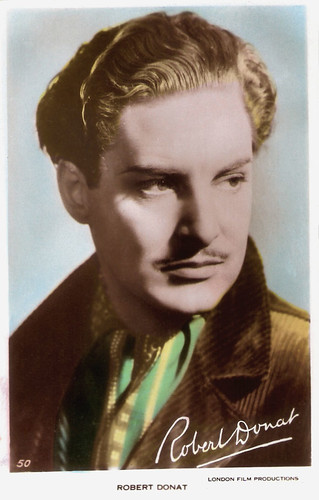
British postcard by Art Photo, no. 37-2. Photo: London Film Productions.
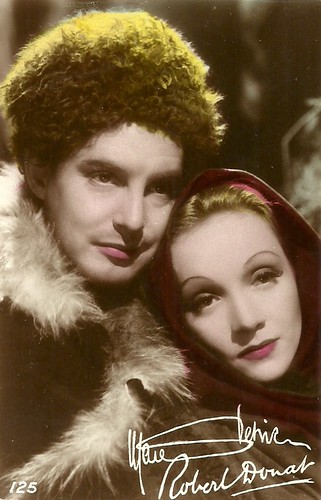
British postcard by Art Photo, no. 125. Marlene Dietrich and Robert Donat in the London Films production Knight Without Armour (Jacques Feyder, 1937). This historical drama set during the Russian Revolution and the Civil War was produced by Alexander Korda from a screenplay by Lajos Bíró adapted by Frances Marion from the 1933 novel of the same title by James Hilton.
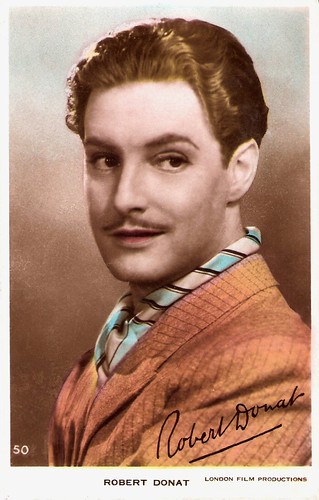
British postcard, no. 50. Photo: London Film Productions.
Vocal embarrassment
Friedrich Robert Donath was born in 1905 in Manchester, England, to Ernst Emil Donath, a Polish clerk, and his wife Rose Alice née Green.
Robert's pleasant voice and somewhat neutral English accent were carefully honed as a boy because he had a stammer and took elocution lessons starting at age 11 to overcome the impediment. It was not too surprising that freedom from such a vocal embarrassment was an encouragement to act.
His other handicap, acute asthma, did not deter him. At the age of 16, he began performing William Shakespeare and other classic roles in some repertory and touring companies throughout Britain.
In 1924 he joined Sir Frank Benson's repertory company, and later he was with the Liverpool Repertory Theatre.
His work was finally noticed by director-producer Alexander Korda, who gave him a three-year film contract.
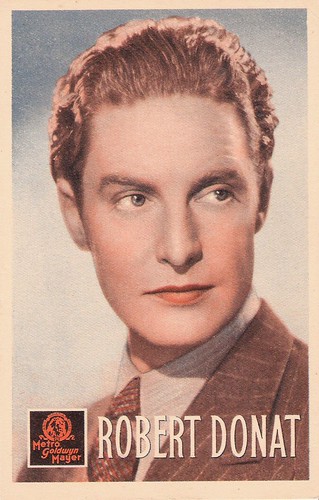
Vintage postcard. Photo: Metro Goldwyn Mayer (MGM).
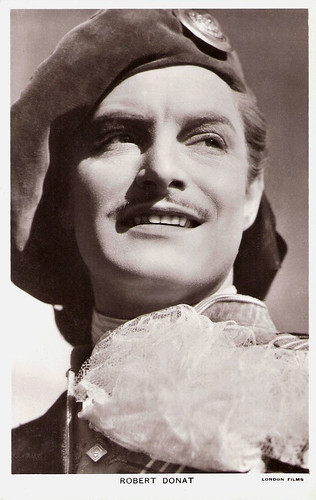
British postcard in the Picturegoer Series, London, no. 1055. Photo: London Films. Publicity still for The Ghost Goes West (René Clair, 1935).
Top draw
Robert Donat made his film debut in Men of Tomorrow (Zoltan Korda, Leontine Sagan, 1932). His first great screen success came with The Private Life of Henry VIII (Alexander Korda, 1933), playing Anne Boleyn's lover, Thomas Culpeper.
Donat's style of acting, whether comic or dramatic, was usually reserved, with the subtleties of face and voice being his talents to complement the role. A top draw in Britain, he went to Hollywood for The Count of Monte Cristo (Rowland V. Lee, 1934).
Later Hollywood usually had to shoot in England if it wanted him badly enough. And that was not a problem after the box office reception given The 39 Steps (1935), the big hit for Alfred Hitchcock.
There was a hint of whimsy in Donat's face that worked especially well with the sophisticated comedic elements that crept into several of his dramatic roles. His portrayal of individualist Canadian Richard Hannay - which registered with North Americans both above and below the 49th parallel - in The 39 Steps was the first of such popular characters.
His most successful films included also The Ghost Goes West (René Clair, 1935), The Citadel (King Vidor, 1938), for which he received his first Oscar nomination, and Goodbye, Mr. Chips (Sam Wood, 1939) opposite Greer Garson. As Mr. Chips he is best known: the shy schoolmaster who blooms under love and becomes an institution for generations of schoolboys. As Brian McFarlane writes in the Encyclopaedia of British Cinema: "Class-ridden and sentimental perhaps, it remains extraordinarily touching in his Oscar-winning performance, and it ushers in the Donat of the post-war years."
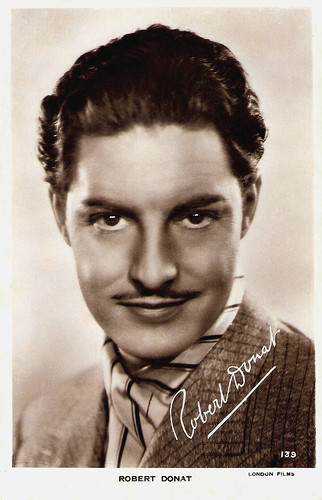
British postcard, no. 139. Photo: London Films.
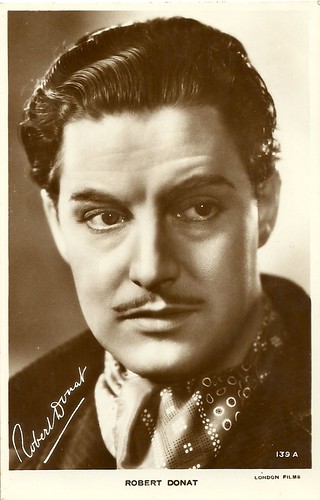
British postcard, no. 139 A. Photo: London Films.
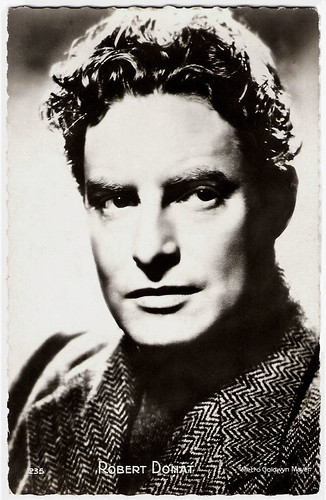
French postcard for Editions P.I., Paris, no. 235. Photo: Metro-Goldwyn-Mayer.
Major theatre star
Alfred Hitchcock attempted to land Robert Donat for three other roles, Sabotage and Secret Agent in 1936 and Rebecca in 1940, but supposedly illness, commitments, and more illness, respectively, kept Donat from accepting each.
Hollywood would be treated in kind, for Donat was more dedicated to stage work. He was a major theatre star, noted for his performances on the British stage.
Well-known were his performances in G.B. Shaw's 'The Devil's Disciple' (1938) and 'Heartbreak House' (1942), 'Much Ado About Nothing' (1946), and especially as Thomas Becket in T. S. Eliot's 'Murder in the Cathedral' at the Old Vic Theatre (1952).
He lobbied hard to be cast in two film roles, neither of which he gained. He wanted to play the Chorus in Laurence Olivier's Henry V (1944), but the role went to Leslie Banks.
Donat longed desperately to be cast against type as Bill Sikes in David Lean's Oliver Twist (1948), but Lean thought him wrong for the part and cast Robert Newton instead.
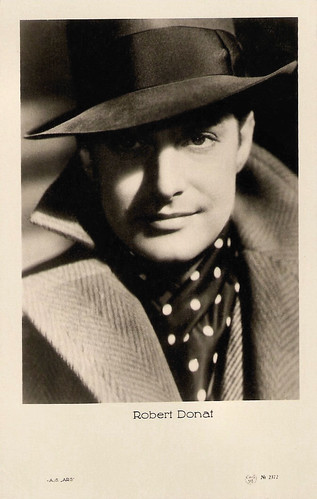
Vintage postcard by A.S. 'Ars'. Photo: E. & G.R., no. 2317.
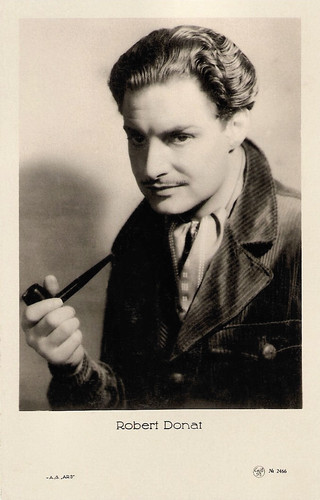
Vintage postcard by A.S. 'Ars'. Photo: Em.G.R., no. 2466.
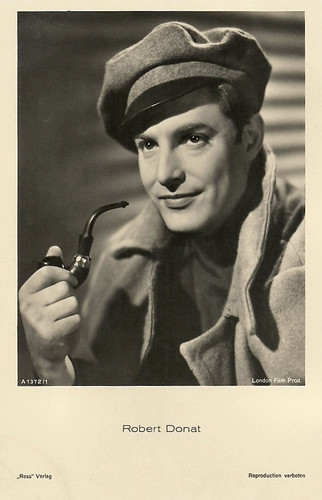
German postcard by Ross Verlag, no. A 1372/1, 1937-1938. Photo: London Film Prod.
Suburban worm
Robert Donat suffered from chronic asthma which affected his career and limited him to appearing in only twenty films. Just six more films were allotted to Donat after the war and into the 1950s, all but one British productions.
He played the suburban worm who thrives during the war in the comedy Perfect Strangers (Alexander Korda, 1945), the charismatic 'turn' - Parnell in Captain Boycott (Frank Launder, 1947), and in The Winslow Boy (Anthony Asquith, 1948), the supercilious defence counsel who warms to the spectacle of unassailable right. He also starred, directed and co-wrote The Cure for Love (1950) and starred in The Magic Box (John Boulting, 1952), a well-crafted and delightful, fictionalised salute to the history of the British film industry.
By 1955, all of Donat's acting efforts required a bottle of oxygen kept off stage and at the ready as his health continued to turn toward the worse. Donat's final role was the Mandarin Yang Cheng in The Inn of the Sixth Happiness (Mark Robson, 1958) opposite Ingrid Bergman. His fragility was poignantly obvious on screen, and he died shortly after the film was finished, aged 53 in London, England.
His biographer Kenneth Barrow writes in 'Mr Chips: The Life of Robert Donat' (1985) on the cause of his death: "Perhaps asthma had weakened him but, in fact, it was discovered he had a brain tumour the size of a duck egg and cerebral thrombosis was certified as the primary cause of death."
Robert Donat was married twice, first to Ella Annesley Voysey (1929-1946), with whom he had three children, and subsequently to British actress Renée Asherson (1953-1958). His nephew is the actor Peter Donat. Robert Donat received a posthumous Special Citation from the USA National Board of Review and was nominated for a Best Actor Golden Globe. He also has a star on the Hollywood Walk of Fame. Donat's career should have gone on, yet it was filled with many notable film memories just the same.
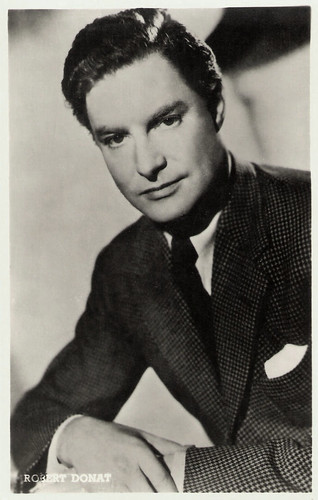
Dutch postcard by J.S.A. Photo: Metro-Goldwyn-Mayer.
Trailer of The Count of Monte Christo (1934). Source: Weild1977 (YouTube).
Sources: Brian McFarlane (Encyclopedia of British Cinema), David Absalom (British Pictures), William McPeak (IMDb), Wikipedia, and IMDb.
This post was last updated on 17 January 2024.
3 comments:
A great tribute post to one of my all time favorite actors - in all his work he managed to give such brilliant performances, really!
I remember the first time I had the pleasure of watching 'The Inn Of The Sixth Happiness', and when I viewed that very last scene I got tears in my eyes.
cheers!
Sebina
Thanks Sebina, My favorite Donat film is The 39 Steps. Every time I see him chained to Madeleine Carroll. I think they are perfect together.
Greetings from Amsterdam, Bob
He is indeed wonderful in '39 steps' - would have loved if he had done more films with Mr. Hitchcock.
My favorite Donat film would be 'The Citadel' and 'Goodbye, mr Chips'
Madeleine Carroll had such wonderful screen presence and her work with Mr. Hitchcock was what introduced me to her, initially!
Cheers!
Sebina
Post a Comment